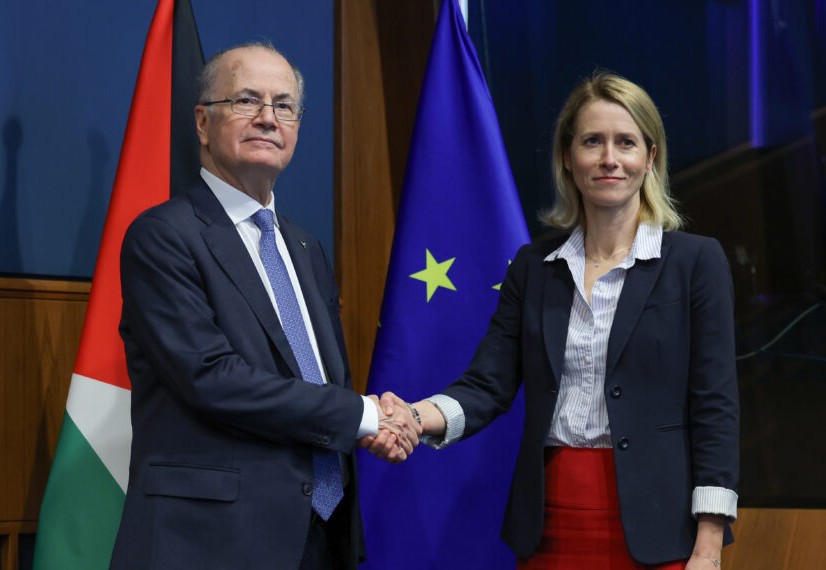The first ever High-Level Political Dialogue between the EU and the Palestinian Authority (PA) took place on Monday after the Foreign Affairs Council with the EU announcing a multi-annual programme for Palestinian recovery and resilience worth up to €1.6 billion.
In her statement after the dialogue, EU’s High Representative for Foreign Affairs and Security Policy, Kaja Kallas, said that the dialogue represented a significant milestone in the EU – Palestinian relations and was an opportunity to discuss the “conflict in Gaza and the importance of a political horizon based on the two-state solution”.
The EU commended the “PA’s readiness to continue its ambitious reform agenda, despite the challenges involved, and will continue to accompany and support the PA on this path”.
In her press remarks, Kallas stressed the importance of the PA delivering on reforms. This is also important for its capacity to govern the Gaza Strip “the day after”. The current Israeli government, which resumed the war in Gaza exactly a month ago, despite the ceasefire-hostage deal with Hamas, opposes even to a reformed PA to take over control of Gaza after Hamas.
At their joint press conference, the Prime Minister of the Palestinian Authority, Mohammed Mustafa, said that Israel resumed the war to prevent the establishment of a Palestinian state and that all its actions add up to continuing the occupation.
A Palestinian state has already been recognised by a majority of countries in the world, he said. He had high expectations of the upcoming “High Level International Conference for the Peaceful Settlement of the Question of Palestine and the Implementation of the Two-State Solution”, hosted by France and Saudi Arabia in June.
While the Prime Minister avoided condemning Hamas’ terrorist attack on 7 October, the EU reiterated its condemnation in “the strongest terms of the brutal and indiscriminate terrorist attack” and recalled that Israel must fully comply with its obligations under international law in all circumstances.
Dubravka Šuica, Commissioner for the Mediterranean, pointed out that everyone supports a two-state solution (except the current Israeli government) but for this the EU needs a credible partner in the form of a reformed PA. In line with EU’s common position, she repeated that there is no place for Hamas in the future governing of Gaza.
Humanitarian supplies running out
In a joint statement, Kaja Kallas and Commissioners Lahbib and Šuica expressed the EU’s extreme concerns by the reports of the humanitarian situation in Gaza, which suggest that food supplies brought in during the ceasefire are running out soon. Under International Humanitarian Law, humanitarian aid must reach civilians in need.
The EU repeated its call on Israel to lift the blockade on Gaza to allow humanitarian aid to start flowing at scale into and throughout the strip. In Israel, part of public opinion is against further humanitarian aid as long as the Israeli hostages are kept in Gaza without any food and it does not differentiate between Hamas and the civilian population.
The government claims that the aid is looted by Hamas and does not reach the civilians for which it is intended. Defense Minister Israel Katz announced on Wednesday morning that Israel would resume humanitarian aid through international civilian aid organisations (which would require Israeli military protection). In the evening, he withdrew his statement after protests by extremists in the government.
Aid package with conditions
Commissioner Šuica also presented the new EU aid package to the PA. The total of up to €1.6 billion will cover the period from 2025 to 2027 and is structured around three pillars: Around €620 million in grants to the PA (€620 million), €576 million in grants for projects on the ground, and support for bank loans (€400 million) to the private sector.
The second pillar includes funding to the UN agency for Palestinian refugees (UNRWA), “once the situation on the ground allows”. Israel has closed down UNRWA’s offices after its reputation as an impartial UN organisation was damaged during the Gaza war.
According to the announcement, most of EU disbursements will be linked to “progress on key reforms in fiscal sustainability, democratic governance, private sector development and public infrastructure and services; contributing to sustainable state-building across Palestinian territories”.
The EU office of Human Rights Watch commented that in recent months, the PA has escalated its repression of dissent, arbitrarily arresting and torturing critics and opponents with impunity. ”As the main donor to the PA, the EU should use its leverage towards concrete security sector reforms, in line with international human rights standards.”
“Israeli authorities’ atrocities do not give the PA a free pass to arrest and torture critics and opponents,” said Claudio Francavilla, associate EU director at Human Rights Watch.
In the past, Israel and the PA cooperated in security matters to prevent terrorist attacks. This cooperation has largely ceased since the outbreak of the war in Gaza and the Israeli government’s failure in reining in settler violence and enforcing the rule of law.
The AJC Transatlantic Institute urged the Commission to ensure that the aid package for the PA “is subject to strict oversight, full transparency, and effective conditionality to prevent EU taxpayer money from supporting terrorism or incitement”.
In November 2023, the European Commission published the results of its internal review of EU's financial assistance for Palestine. The finding showed according to the Commission that the safeguards in place were effective but could be improved on certain points.
M. Apelblat
The Brussels Times

